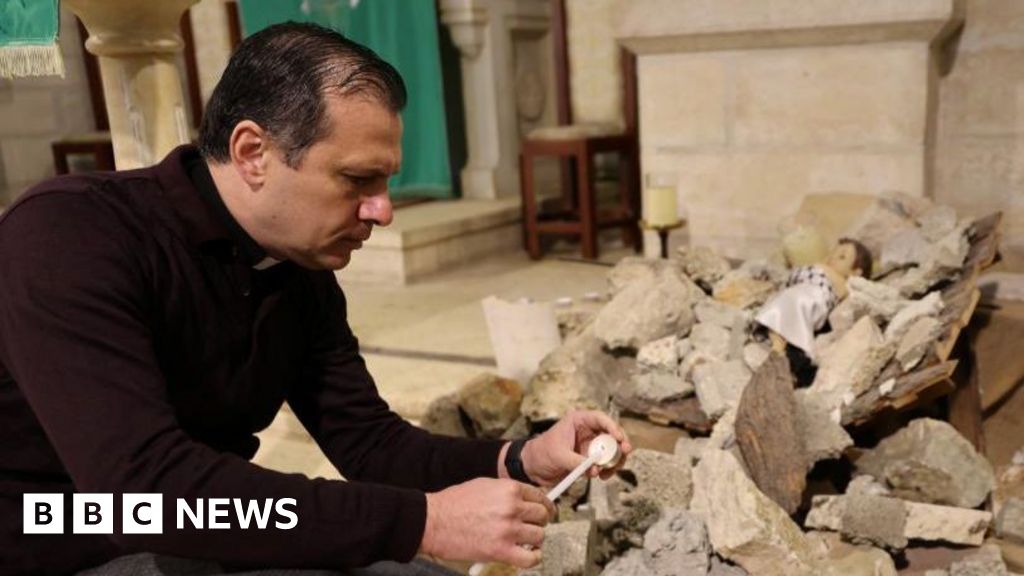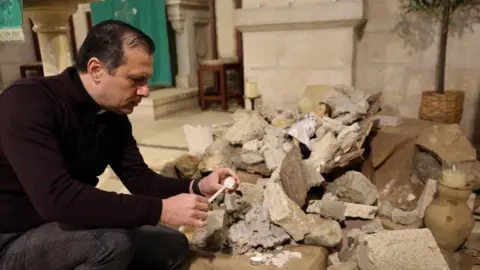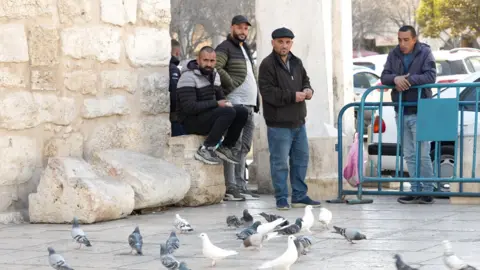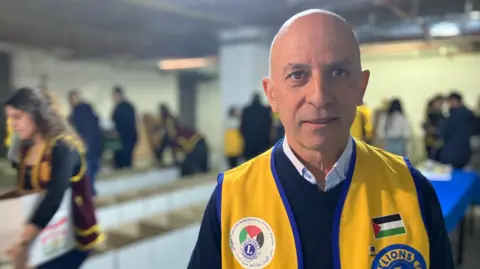Physical Address
304 North Cardinal St.
Dorchester Center, MA 02124
Physical Address
304 North Cardinal St.
Dorchester Center, MA 02124

 Reuters
ReutersThe small town of Bethlehem in the occupied West Bank has good reason to consider itself the capital of Christmas, but this year it doesn’t seem that way.
There are very few visitors at what is usually rush hour. There are none of the usual cheerful street decorations or the giant Christmas tree in front of the Church of the Nativity, built on the site where Jesus is believed to have been born.
Public Christmas celebrations have been canceled for the second year due to the war in Gaza. Palestinian Christians only attend religious ceremonies and family gatherings.
“This should be a time of joy and celebration,” says the Rev. Dr. Munther Isaac, a local Lutheran pastor. “But Bethlehem is a sad city that stands in solidarity with our brothers in Gaza.”
In its church, the Nativity scene shows the Baby Jesus lying on a pile of rubble. On Christmas Eve, a prayer service focused on the catastrophic situation in Gaza.
“It is hard to believe that another Christmas has come to us and the genocide has not stopped,” Isaac said in his energetic sermon. “The decision makers are content to let this continue. For them, the Palestinians are expendable.”
Israel strongly denies accusations of genocide in Gaza and judges at the UN’s top court have yet to rule on a case alleging genocide, brought by South Africa.
Many Bethlehemite Christians I know are feeling desperate and questioning what they see as the failure of other Christian communities around the world to speak out.
Close ties between members of the small Palestinian Christian community mean many locals have family and friends in Gaza.
“My mother told me that what we see on television doesn’t capture one percent of what’s happening,” says theologian Dr. Yousef Khouri, originally from Gaza City.
His parents and sister are among a few hundred Christians who have spent much of the past 14 months sheltered in two Gaza churches.
“They are subjected, like the entire Gaza Strip, to hunger. Of course, almost without sleep due to the bombings, all the drones that fly over their heads and the lack of medical care and services,” he says.
“We have lost friends and family.”

In Gaza, more than 45,000 people have died in the war unleashed in response to Hamas attacks in southern Israel. The figures come from the Hamas-run Health Ministry, but are considered reliable by the UN and other bodies. The October 7, 2023 attack killed about 1,200 people (Israelis and some foreigners) and led to the taking of about 250 hostages.
Tensions have increased in the West Bank in parallel with the war. Israel has imposed new restrictions on Palestinian movements and canceled tens of thousands of permits for workers who used to cross into Jerusalem or Jewish settlements each day.
The economy is in dire straits, especially in Bethlehem, which relies heavily on tourism, which has almost completely stopped. The guides stand idly by the Church of the Nativity, feeding the pigeons.
“If there are tourists, all the people will work: hotels, transportation, accommodation, everyone,” says a guide, Abdullah. “But if there are no tourists, there is no life in the city of Bethlehem.”
“I’m broke! I have no business! For more than a year we stayed at home,” exclaims Adnan Subah, a souvenir seller on Star Street.
“My son is a tour guide at the church, we stay at home, all my children stay. No work, no business, no tourists.”

Many local Christian and Muslim families have emigrated in the past year. With the constant threat of violence and settlement expansion in lands where Palestinians have long sought an independent state of their own, fear and uncertainty about the future is growing.
But one community group in Bethlehem is trying to make a difference: packaging food parcels for those in need. There is no government assistance here and volunteers have been collecting donations, including from those in the diaspora.
“As you know, Christmas is the spirit of generosity, love and joy. And we hope that with this package we can give some hope and joy to families in our area,” says Wael Shaer, director of the Palestine Lions Club.
I follow Wael making his first delivery to a woman who lives in a nearby apartment. Her husband is sick and out of work. Gratefully, she opens the box of supplies given to her and takes an envelope with cash.
She and Wael exchange the customary Christmas greeting, wishing each other a peaceful year ahead.
“Mission accomplished!” Wael tells me as we walk away.
“Spread some Christmas cheer.”